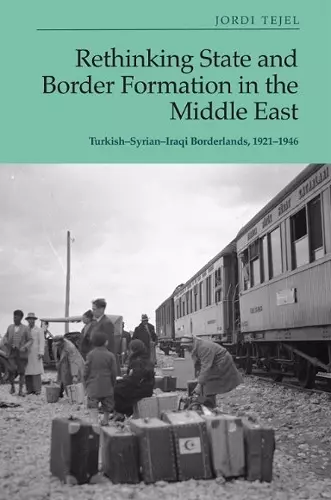Rethinking State and Border Formation in the Middle East
Turkish-Syrian-Iraqi Borderlands, 1921-46
Format:Hardback
Publisher:Edinburgh University Press
Published:18th May '23
Currently unavailable, and unfortunately no date known when it will be back
This hardback is available in another edition too:
- Paperback£24.99(9781399503662)

While the wars in Iraq, Syria, Libya and Yemen, alongside the establishment of the so-called "Islamic Caliphate" have brought the debate about the crisis of the territorial nation-state in the Middle East once again to the fore, this issue cannot be simply understood as the logical consequence of either an imported political construction or the purported artificiality of Middle Eastern borders. Instead, the process of state formation in the region has been a complicated course that involved different institutional traditions, managing societies marked by varying degrees of political loyalty to central power, and dealing with colonial interference. Rethinking State and Border Formation in the Middle East seeks to disentangle some of these complexities by proposing both a decentred and dialectic approach. Taking its cue from the bourgeoning field of borderland studies and a variety of historical sub-disciplines, this monograph pays attention to the circulation of people, goods, diseases and ideas as well as to the everyday encounters between a wide range of state and non-state actors in the borderlands laying between Turkey, Syria and Iraq. The goal is to provide a much more holistic yet finely-grained understanding of the formation of the territorial state in the interwar Middle East.
Rethinking State and Border Formation in the Middle East studies borders and bordering as dialectic processes, in which policy and the reality of border were mutually constitutive. Empirically rich and meticulously researched, the book masterfully weaves together the macro-level of international relations, with the micro-level of borderlanders' lives. Inhabiting the pages of the book are nomads, rebels, smugglers, refugees, trains, cattle, locust and germs, whose mobility were affected by and helped shape the reality of the tri-border zone laying between Turkey, Syria, and Iraq. -- Liat Kozma, The Hebrew University of Jerusalem
Theoretically astute and empirically meticulous, Jordi Tejel’s Rethinking State and Border Formation in the Middle East deftly navigates between high diplomacy and everyday issues on the border. Tejel exposes a region long left out of conventional histories by centering the dynamism of borderlanders themselves, including border-crossing Sufi healers, silk-stocking smugglers and polyglot merchants who used Ottoman currency even after the empire’s demise. -- Samuel Dolbee, Vanderbilt University
Jordi Tejel’s Rethinking State and Border Formation in the Middle East offers a fresh perspective on the region’s state and boundary formation process during that critical juncture of the first two decades after the fall of the Ottoman Empire. -- Anuradha Jangra, Jawaharlal Nehru University * Kurdish Studies Journal *
There is little doubt that Rethinking State and Border Formation in the Middle East is a major scholarly achievement. Supported by extensive original research conducted in British, French, German, and Turkish archives, Tejel presents a vivid account of the Turkish-Syrian-Iraqi borderlands at a critical historical juncture. -- Djene Rhys Bajalan, Missouri State University * Bustan: The Middle East Book Review *
ISBN: 9781399503655
Dimensions: unknown
Weight: unknown
376 pages